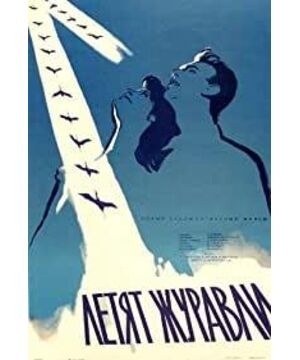The film was made in 1957 (a very special year of world political history). In 1956, Khrushchev became the supreme leader of the CPSU and published a long report called "Secret Report" at the 20th Congress of the CPSU. The atrocities of the Stalin era are revealed abundantly. The Soviet Union is the kingdom of socialism, the myth of socialism has been exposed and self-destructed from the inside, and its ugliness has been torn apart. After such a political turn, there was a period of so-called "thaw" in Soviet cinema, Soviet literature and art, before the divine decree of socialism began to be questioned. The time-honored Soviet film art began to take on a new face. A new generation of filmmakers entered the film industry, and their debut films formed one of the most striking phenomena when the film was unfrozen. We can also call "thawed cinema" the New Wave of Soviet cinema, a continuation of the new wave of cinema after the war. Because he, like all the new wave of films, contains two important components: the debut of a new generation, and a group of new directors entering the film stage as a whole; a new generation of newcomers has brought a revolution in film aesthetics and refreshed the film as a whole. The appearance of the film has completely changed the film style, film narrative, and film language that had gradually become rigid in the studio systems of different countries.
"Yan Nanfei" is a film about a heartbreaking love story during World War II. The theme of the film is quite old, about war and peace, about people in war, and about the destruction of human emotions by war, especially love and lovers. . With the help of the name of a novel by García Márquez, it can be translated as "Love when the war spreads". “Since Shakespeare, everything has been dull, but in the absence of new stories, there are always fresh lips. We always have fresh ways of telling old stories that take on a completely different meaning.
Why doesn't a very old story become an old story? How can a very old theme still be handled so powerfully? According to Mr. Dai Jinhua, the so-called fresh lips are not an abstract imagination. Every old story will be refilled by a still fresh historical experience, especially when the historical experience is a skin-cut wound that is still bleeding when the experience is very different.
Soviet cinema has left us with a huge and precious sequence of films about wars, specifically World War II, one of the most tragic wars in the history of human civilization that the Soviets called the Great Patriotic War. Soviet writer, Soviet filmmaker once said a very famous saying "live and remember". Lenin, the political leader of the Soviet Union, famously said, "Forgetting the past means betrayal."
"Live and remember", he directly transferred the most painful historical testament of the Soviets who had lived through World War II. He is a historical testament passed down from generation to generation, so more than three generations of Soviet filmmakers have recorded the Great Patriotic War in audio-visual language in different ways, from different angles and with different experiences. The Soviet Union was one of the most tragic battlefields in World War II because it was only this country. It fell into a state of local combat in an all-round way, and in a situation where it was almost irresistible, it stubbornly resisted the German Nazi attack, thus turning the situation of the European battlefield of World War II around as a whole.
Twisting camera movement
In such a brutal local battle, more than 20 million Soviet people died directly on the battlefield of World War II, and my uncle still has the pain and cultural memory that Tang Xue cannot heal. It is a highly intrinsic reason why films like Yan Nanfei can have such a strong fresh and charming appeal.
There are three train farewell scenes in the film, two of which have Veronica, and it is you who takes a long-shot continuous pan to show us the relatives inside and outside the carriage who are about to be separated by war. This scene is repeatedly mentioned. And - and become a classic passage in film history. He tells us about the cruelty of war, and perhaps not having to accept the high costs of those bloody things. The presentation of the big battlefield, on such a train platform, the lens inside and outside the train is enough. Such a scene of being forced to be separated and suddenly torn apart in peaceful daily life is full enough to accuse war, and use a person in a peaceful era to recognize the existence of a human atrocity called "war" .
View more about The Cranes Are Flying reviews






